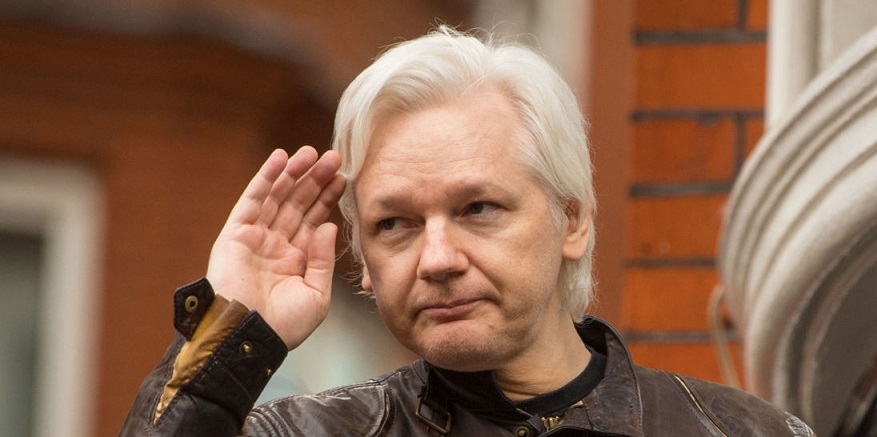Ecuador sours on Assange
May 16, 2018 | Expert Insights

It has now been reported that the government of Ecuador has spent over $5 million on creating an elaborate security and surveillance network around WikiLeaks founder Julian Assange. Assange had taken refuge in Ecuador’s embassy in the UK. A report from The Guardian also notes that despite these measures, Assange himself had hacked into the embassy’s systems and accessed personal communication.
Background
Julian Assange is best known as a computer programmer, hacker and the founder of the controversial WikiLeaks. Started in 2006, WikiLeaks publishes secret information, news leaks, and classified media provided by anonymous sources. It claims a database of 10 million documents in 10 years since its launch. It made headlines around the world in April 2010 when it released footage showing US soldiers shooting dead 18 civilians from a helicopter in Iraq. Much of those leaks had been provided by Chelsea Manning. Following these leaks in 2010, the US government launched a criminal investigation into WikiLeaks and asked allied nations for assistance.
In the same year, Sweden issued an international warrant against Assange. He had been accused of raping two women in the country. Even though he surrendered to UK police in December 2010, he absconded and breached his bail. In 2012, he was granted asylum by Ecuador. Since then, he has been a resident of the Embassy of Ecuador in London.
WikiLeaks played a prominent role during the 2016 US Presidential elections. It hosted emails sent or received by candidate Hillary Clinton from her private email server when she was Secretary of State. Some experts have stated that Russia played a role in obtaining the emails and provided them to WikiLeaks – this is a charge that WikiLeaks has denied. Assange himself has remained a polarising figure with the public.
Analysis
A report by The Guardian has now claimed that the government spent nearly $5m to provide protected internet access to Assange. The report also notes that despite having been given asylum and access to the internet, Assange hacked the embassy’s systems. The report, which was written in collaboration with Focus Ecuador, has cited anonymous sources.
The documents also claim that Assange was able to compromise the network at the embassy to utilize a satellite internet service and intercept communications intended for other staff members. WikiLeaks took to its official Twitter platform to deny the report noting, “That’s an anonymous libel aligned with the current UK-US government onslaught against Mr. Assange.” The account also added, “No, @Guardian, @JulianAssange did not "hack into" embassy satellites. That's an anonymous libel aligned with the current UK-US government onslaught against Mr. Assange's asylum--while he can't respond. You've gone too far this time. We're suing.”
According to the initial report by The Guardian, Ecuador spent millions on a secret intelligence budget which protected the WikiLeaks founder. During this period, he fielded visits from Nigel Farage, members of European nationalist groups and individuals linked to the Kremlin. He also met with hackers, activists, lawyers and journalists. The money was also spent to spy and monitor Assange’s activities within the embassy. Despite these measures, he allegedly hacked their systems to read the personal communications of those within the embassy. In 2014, Assange allegedly breached the embassy’s network security, reading confidential diplomatic material and setting up his own secret communications network.
The report comes during a period when Ecuadorian politicians and leaders have grown wary of supporting Assange. A poll in March showed 76.2% of Ecuadorians wanted the government to expel Assange from the embassy. Ecuador’s president, Lenín Moreno, has in the recent times described Assange in unflattering terms calling him a “hacker”, an “inherited problem” and a “stone in the shoe”.
Assange previously caused problems for the Ecuador government when he Tweeted his support for the Catalan independence movement that threatened to sour ties between Ecuador and Spain. Meanwhile, Ecuador has also reportedly cut off Assange’s access to the internet since March 2018. The government is hoping that confinement without access to the internet would force him to leave the premises.
If Assange were to leave the embassy, he would be arrested for breaching bail. In addition, the US would want to extradite him in order to pursue criminal investigation. Sweden dropped its investigation as it was unable to secure an interview with him.
Assessment
Our assessment is that the Ecuadorian government is clearly aiming to get rid of Assange from its embassy’s premises. Ecuador granted Assange a citizenship in January 2018, but it also cut his access to the internet to push him out. Given the multitude of legal problems surrounding him, it is unlikely that Assange would leave his safe haven, even if he no longer has constant access to the outside world.








Comments